Hiring Trends Index: a look at the recruitment landscape of Q2 2023
Totaljobs’ Hiring Trends Index gives employers a first look of the latest quarter of the UK labour market, and the recruitment trends shaping it. In this edition, we look at the second quarter of 2023 with a focus on how businesses are integrating AI in the recruitment process and the workplace.

The Q2 2023 edition of our Hiring Trends Index takes an in-depth look at insights from 1,005 HR experts. This instalment has a focus on AI in recruitment and the workplace, looking at how businesses are integrating it.
Hiring Trends Index – key findings at a glance
Inflation in the UK has proved stickier than expected, which caused the Bank of England to raise interest rates to a 16-year high at 5%. Economists expected the inflation rate to drop from 8.7% to 8.2% in the second quarter of the year, and surprisingly the rate dropped to 7.9%.
The Bank of England have also reviewed their forecasts and now predict inflation to be around 5% by Q1 2024, which is significantly higher than their prediction from the beginning of the year. Positively, the labour market has been growing with more people joining, and the number of payroll employees in the UK reached 30 million. However, loosening of the labour market meant both the employment and unemployment levels increased (to 76% and 4%, respectively).
As a result of the ongoing economic pressures, workers are demanding higher wages that can keep up with the inflation. The growth in regular pay in the past 12 months reached 7.3%, the highest outside of the pandemic. Some businesses are beginning to lean on automation and AI to supplement their workforce. However, we found that 47% of businesses haven’t started using AI tools to automate processes at work so far.
Top takeaways from the Hiring Trends Index Q2 2023
- The labour market continued to grow in the second quarter as the employment and the unemployment rate both increased, to 76% and 4% respectively.
- 81% of businesses recruited in Q2 2023, slightly more than the last quarter (78%) – although vacancies have been dropping, they remain above 1 million (25% higher than pre-pandemic levels).
- More than a third (34%) of businesses increased recruitment in the second quarter of 2023, same as Q1 2023.
- Average time to hire decreased from 6.4 weeks in Q1 to 5.8 weeks in Q2.
- 57% of businesses are confident they will recruit the people they need in Q3 2023 – which is consistent with Q1 2023 and rising from 53% reported in Q4 2022.
- Businesses have started to implement AI tools to automate processes. The most popular departments where AI is used include; Technology/IT (23%), Operations (11%) and PR and marketing (10%).
- 2 in 5 (40%) businesses also report using AI in the recruitment process to source (11%) or screen candidates (12%), schedule interviews (11%), create job adverts (11%) and interview questions (10%).
The last three months
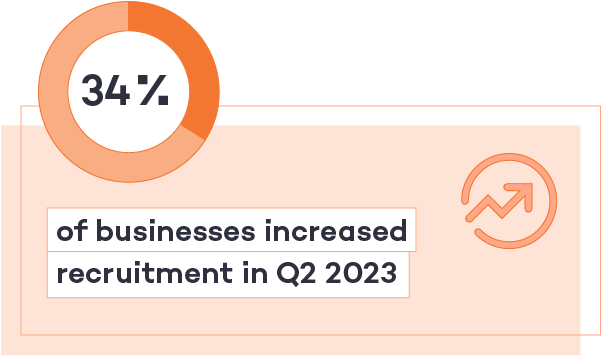
81% of businesses recruited in Q2 2023, and 1 in 3 (34%) of those who hired increased recruitment. As we’ve covered in the previous hiring trends index, employers are unlikely to stop hiring altogether due to ongoing labour shortages. Vacancies now sit at 1,051,000, which is only 25% lower than April last year and still above pre-pandemic levels.
Students and early retirees have been joining the workforce to cope with the cost of living; decreasing the number of those economically inactive. Despite more joiners to the workforce in the past couple of months, the UK labour market remains tight. At the same time, the number of those reporting long-term sickness reached a new record – now at 2.55 million.
As people increasingly started joining the labour market, the time to hire reduced to 5.8 weeks in Q2 from 6.4 weeks in Q1. Businesses also continued to hire temporary staff, freelancers or contractors (16%) at the same rate as the previous quarter. 1 in 5 businesses restructured a department, team or wider business.
Similarly to Q1, businesses that recruited in Q2 2023 were most likely to hire for Operations (26%), Technology/IT (25%), Sales (17%), and Customer Service (17%) roles.
| Percentage of firms which increased recruitment between April-June 2023 | |
|---|---|
| Medical & health services | 46% |
| Transport & distribution | 44% |
| Media/marketing/advertising/PR & sales | 40% |
| Construction | 39% |
| Manufacturing | 38% |
| Legal | 38% |
| Hospitality & leisure | 36% |
| Education | 36% |
| Finance & Accounting | 35% |
| Retail | 29% |
| IT & Telecoms | 27% |
| Real estate* | 26% |
Recruitment in Q3 2023
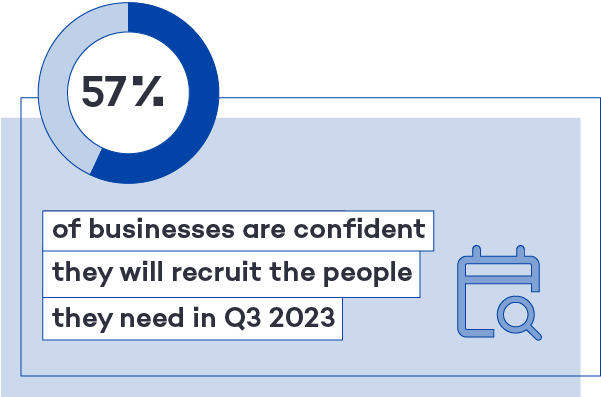
Business confidence has ticked up in the beginning of the year, and majority (57%) of employers continue to feel confident about recruiting the people they need.
26% of businesses plan to increase recruitment in Q3 2023, with transportation and distribution (35%), hospitality and leisure (34%) and medical and health services (34%) being the most likely industries to increase hiring. Of those who plan to hire, 16% say they will increase recruitment spend for specialist roles. Meanwhile, 14% plan to hire more temporary workers, freelancers or contractors.

In the second quarter of 2023, wage growth picked up again, reaching a historic high at 7.2% year on year in April 2023. This was partly due to the increase in national living wage, which was set to £10.42 an hour for those aged 23 and older.
In the coming months, economists are expecting a wage-price spiral scenario; meaning further wage growth could fuel inflation and vice versa. The demand for higher wages is unlikely to slow down as the most significant price increases are felt across basic needs such as housing, energy and especially food. Around 4 in 10 adults are finding it difficult to afford rent or mortgage payments – up from 25% last month.
At the same time, labour shortages in certain industries are an ongoing factor that strengthens the negotiating position of workers. For UK businesses to continue growing and for an improved GDP outlook, companies need to streamline their hiring and retention efforts.
In our previous edition of HTI, we’ve found that 16% of businesses were investing in technology and automation to supplement their workforce. As the technology in this space advances, businesses may lean more on AI and automation to increase productivity.
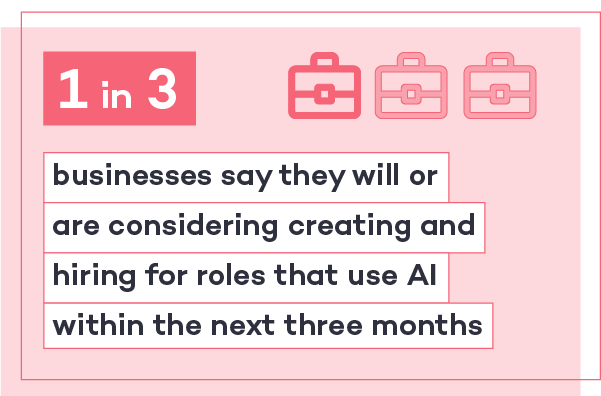
There is also increasing interest in AI, and 33% of businesses say they are ready to hire more for roles that use AI in the next quarter.
Integrating AI into the workplace
According to our findings, 53% of businesses use AI in some capacity in their business to automate processes. When broken down by organisation size, 39% of small businesses, 56% of medium businesses, and 79% of large businesses use AI tools in their business.
The most popular departments where AI tools have been implemented are: Technology/IT (23%), Operations (11%) and PR and marketing (10%). On average, almost 1 in 5 (19%) businesses say they expect to increase their use of AI within day-to-day work before the end of 2023.
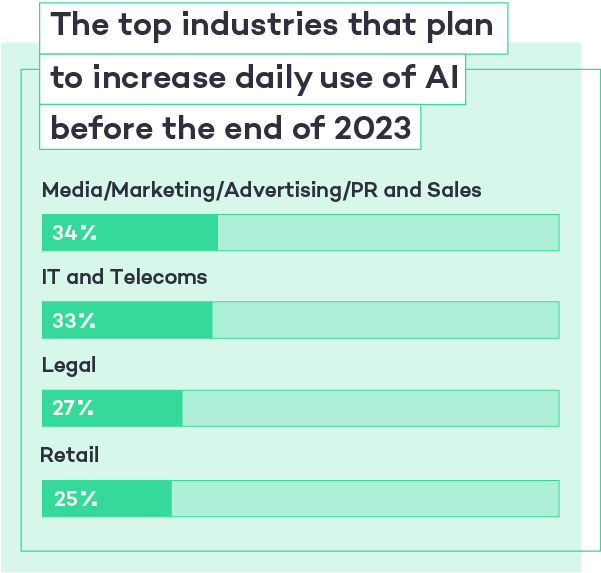
So how do workers feel about using AI at work? We previously explored this question and found that 2 in 5 workers think they don’t have the necessary skills to make the most of AI tools available in their workplace.
Younger generations and office workers are generally more excited about the future possibilities and innovations AI will bring to their industry (48% of Gen Z and Millennials vs. 33% Gen X and Boomers, 59% of office workers vs. 47% of manual workers). Yet, the general perception on AI is divided.
While 56% of workers say AI will empower them to learn and develop new skills, 44% think AI would make their current skills obsolete or unneeded. Therefore, businesses play an important role in eliminating hesitations around AI and training staff to save time on tasks and increase productivity.
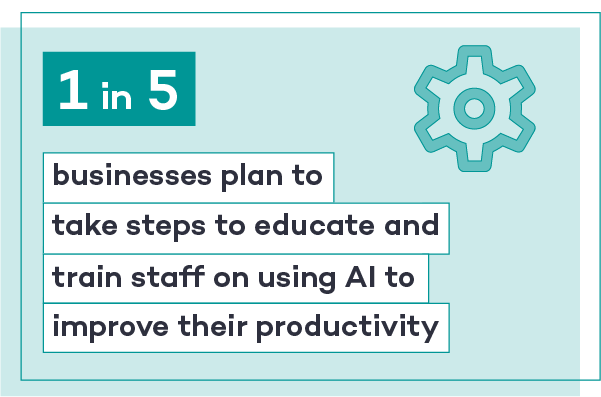
20% of businesses say they expect their business to take steps to educate and train staff on using AI to improve their productivity. The top industries that expect this are: Finance and Accounting (30%), Media/Marketing/Advertising/PR and Sales (29%), IT and Telecoms (28%).
How are businesses using AI for recruitment?
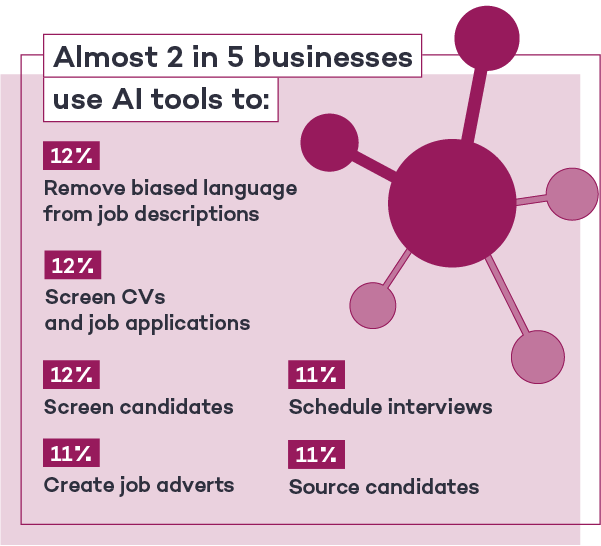
These applications correlate with candidate expectations as over half (52%) of jobseekers say they would be comfortable with applying for a job where a small part of the process is driven by AI – mostly including sourcing and screening candidates, scheduling interviews, and creating or tweaking job adverts.
AI is also helping candidates save time during the application process, as they can use tools such as ChatGPT to polish CVs and cover letters. Almost half (46%) of jobseekers say they would be happy to share their data with an AI platform if they would receive better matched, personalised job offers.
However, candidates have some concerns as well. 72% say they are concerned about AI not picking up blind spots and think it should be mandatory for companies to outline how and why they are using AI in the recruitment process.
With almost a quarter (23%) of large businesses expecting to increase the use of AI in the recruitment process by the end of 2023, AI in recruitment appears to be an evergreen topic.
Summarising our findings, European Labour Economist Julius Probst said
Inflationary pressures are prompting candidates to explore opportunities with higher salaries elsewhere, leading to increased movement within the job market. This heightened mobility underscores the growing battle for talent, emphasising the need for businesses to exert additional effort in attracting and retaining the skilled professionals they require. Businesses are recognising the value of leveraging AI technology to streamline their hiring procedures and improve efficiency.
As the job market evolves, it is imperative for businesses to embrace innovative solutions like AI to stay ahead, streamline processes, and secure the talent they need. By combining strategic talent management approaches with the integration of AI, organisations will be better placed to achieve their recruitment objectives in the current climate.
Julius ProbstEuropean Labour Economist
Totaljobs – Your hiring solution partner
Work with an industry-leading hiring solutions provider that understands your challenges. Part of the global recruitment technology company the Stepstone Group, Totaljobs is a cutting-edge recruitment solutions partner whose goal is to find the right job for everyone. Find the right people for your business by reaching wider talent pools, increasing your brand’s visibility and maximising your hiring budget.
HR decision-maker’s sample
All figures, unless otherwise stated, are from YouGov Plc. Total sample size was 1,005 HR decision-makers. Fieldwork was undertaken between 8th – 15th June 2023. The survey was carried out online. The figures have been weighted and are representative of business size.

